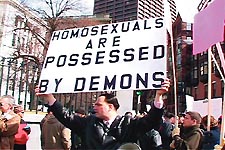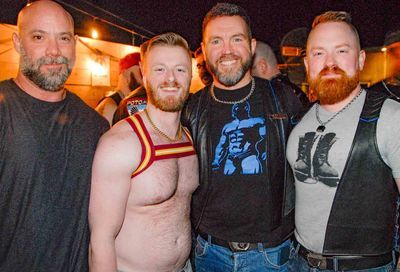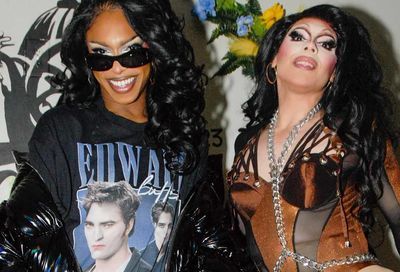Heart of the Matter
'Tying the Knot' finds compelling stories of gay marriage
Near the end of the gay marriage documentary Tying the Knot, an Oklahoman farmer named Sam sits outside the home he’s fighting desperately to keep and makes a phone call that deals a visceral blow to his already teetering pride. On the losing end of a probate battle with his dead husband’s distant relatives, Sam has no choice but to ask a friend to loan him some money to keep the electricity on. The pain, the sadness and the loneliness are palpable as he ends the call.
That one moment captures the importance of marriage rights for gays and lesbians more completely and more emotionally than any other in Tying the Knot, which is both the documentary’s greatest strength and greatest flaw.
For his first feature, director Jim de Sève has constructed a documentary that aims to educate and motivate its audience on the politics of same-sex marriage. Unlike most documentaries of this type, Tying the Knot opens Friday in limited release in mainstream theaters, the benefit of covering a topic that remains hot around the country.
 |
But while the theatrical release schedule suggests that de Sève is targeting both the gay and lesbian faithful and the undecided middle on the issue of same-sex marriage, the film itself is harder to see as making its case for those who are opposed to or undecided about gay marriage.
 De Sève opens with a montage of happy, kissing gay and lesbian couples contrasted with red-faced screaming anti-gay protestors. This sets up the debate as one of love versus hate, with no middle ground there for those who, perhaps, consider themselves accepting of gays but uneasy with gay marriage. There are a handful on person-on-the-street interviews on the topic, but there’s little in the didactic sections of the film for the non-gay audience to latch on to.
That imbalance is corrected in large part when de Sève focuses on his two examples of why gay marriage matters, the above-mentioned Sam, and Mickie, a Tampa cop whose partner Lois, also a cop, was killed by bank robbers.
Sam married a woman while young and fathered two sons, but divorced his wife after returning from Vietnam. When he met Earl, they quickly fell in love and built a life together on their farm. Unfortunately, all the property was in Earl’s name — when he passed away, Sam suddenly found himself at the legal mercy of cousins he barely knew who openly bragged that they would sell Sam’s farm and house as soon as the court gave them possession.
Mickie’s struggle was very public. Her partner’s death was heavily covered in the news, and Mickie’s decision to fight to receive her partner’s police pension made headlines nationwide. Although she and Lois had entered into a holy union with the support of Lois’ family, Mickie found herself locked in a battle with the in-laws when pension money entered the equation.
|
Both stories are compelling — seeing Mickie sit in a room full of older, paunchy white guys who proceed to vote unanimously to deny her Lois’ pension is an exercise in frustration. Watching Sam tour the dilapidated shell of a house where he’ll be forced to live is a moment of anguish impossible not to share.
The fact that both these stories make such a clear and compelling case for same-sex marriage is why it’s so frustrating to have to sit through so many talking heads and C-SPAN excerpts of politicians. Yes, right-wing radicals sound like nuts when they talk about gay people. Yes, politicians are craven when they deal with this hot button issue.
But political posturing and speechifying is, often as not, for those who’ve made up their minds. Stories such as Mickie’s and Sam’s are the ones that can make change — and the ones that give Tying the Knot a powerful resonance.
Support Metro Weekly’s Journalism
These are challenging times for news organizations. And yet it’s crucial we stay active and provide vital resources and information to both our local readers and the world. So won’t you please take a moment and consider supporting Metro Weekly with a membership? For as little as $5 a month, you can help ensure Metro Weekly magazine and MetroWeekly.com remain free, viable resources as we provide the best, most diverse, culturally-resonant LGBTQ coverage in both the D.C. region and around the world. Memberships come with exclusive perks and discounts, your own personal digital delivery of each week’s magazine (and an archive), access to our Member's Lounge when it launches this fall, and exclusive members-only items like Metro Weekly Membership Mugs and Tote Bags! Check out all our membership levels here and please join us today!



















